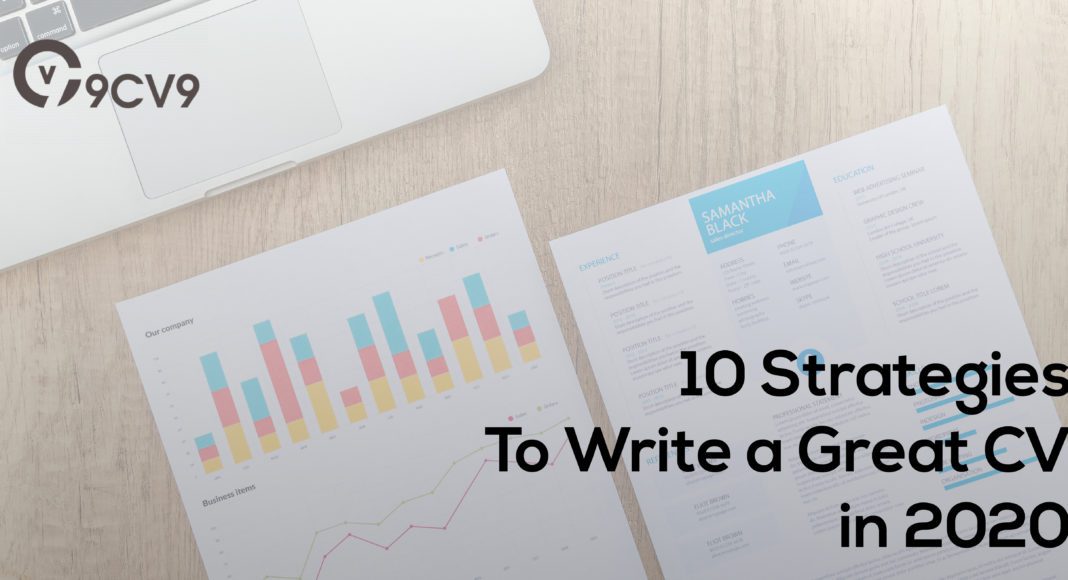Writing a CV or (“Curriculum Vitae”) is one of the most important if not the most important basic skills to have as an employee. We did our basic guide on writing a good CV. But, as it turns out, many people struggle to write a competitive CV. As a matter of fact, of all 250 resumes, 4 to 6 will get called for an interview, and only one will get the job. Especially in 2020, the competition to get jobs is even more fierce than before. So, how do you make a winning cv to get your dream jobs? Here we give you our 10 Strategies To Write a Great CV in 2020
We’re going to go over this in 3 segments to build your perfect general CV:
1. Pre-Writing
2. Writing Details
3. Other Tips and Tricks
1. CV PRE-WRITING
1.1. Start With Research
One of the most common (and ironically) biggest mistakes that job seekers make is failing to do the proper initial research. Getting to know the job or internship you are applying for is fundamental to writing a great CV. Employers will most likely notice your CV, and will be potentially impressed if you exhibit the skills and criteria that they are looking for.
To start off, search for jobs that are in your area of skills and knowledge. Most of those jobs will come with the candidate’s requirements. It is crucial for you to write these requirements that keep appearing and make a list of them.
You might want to look at some of the hard skills that keep appearing instead of soft skills. We found that most of the soft skills that are in job seeker’s CV are, really, applicable for most jobs. It wouldn’t be anything special that would catch the employer’s attention if it’s a common skill to have, right?
1.2. List down all the relevant information about yourself
Now that you have done your homework, you should know what to fill into your CV. From reviewing countless CVs ourselves, we found out that a CV content falls under the must-have category or the optional category.
The must-have category is usually that information that is crucial and important to employers. This usually includes:
- Contact information, i.e., Email, Address, Mobile Number
- CV Summary or objective
- Work experience
- Skills
- Education
- Accomplishments
The optional category contains information that is not always important, but is a good thing to have if you feel like it could help you get the chance of proceeding to the next stage of the hiring process. The information usually relates to your potential job and requirements.
This usually involves Certifications and awards, Languages, Personal projects, and/or Volunteer Experience.
You want to list down what do you want to put into your CV. Any writing tools will do, from Google Docs, Microsoft Words, even Notepad. Listing down what you want to put in will help you to narrow down what important things you should put in your CV.
1.3. Choose your CV layout and format
“A logo doesn’t sell (directly), it identifies.” —Paul Rand
A great CV is like a logo, a self-branding if you will. People might say that CV is one of the ways that employees sell themselves to an employer. At first glance, recruiters know you indirectly via your CV. It only makes sense that a CV identifies who you are as an employee. Such as logo, there are several things to consider when you are building your CV in the aspect of layout and format.
The most common tips that people give when asking for the format using “no more than 2 pages of A4 paper.” We agree with this statement. Glassdoor said that “On average, each corporate job offer attracts 250 resumes”. No one is going to read your real-estate stories.
There is an abundance of examples and templates out there. While these can be useful, one of the most common mistakes employees make when building a CV is not representing their selves enough. The color psychology theory should help you to define who you are. Picking the right font is also crucial to make it easy to read for the employer. But one of the most important things to note is to be consistent with your color and fonts.
Above all else, a CV should look professional and easy to navigate. Recruiters would love to review a CV that is easy to navigate and looks professional. We’re applying for a professional job, so it would only make sense to give up something that is professional, especially when you’re selling yourself.
2. CV WRITING DETAILS
2.1. Only include your address if it works in your favor.
If you’re applying to positions in the city or town you already live in, then go ahead and include your address. In this case, it lets the hiring manager know you’re already in the area and could theoretically start working right away.
But if you’re targeting jobs in another area and you’d need to move in order to start working, it’s probably a good idea to leave your current address off of your resume. Why? Recruiters are sometimes less excited to interview candidates from another city or state since they often require relocation fees.
2.2. When it comes to skills, quality over quantity.
There’s no need to list skills that most people in the job market have (Think: Microsoft Office, email, Mac, and PC proficient), which can make it look like you’re just trying to fill up space on the page. Keep your skill section short, and only include impactful skills that are relevant to the job you’re applying to.
2.3. Skip generic descriptors.
Hardworking, self-motivated, self-sufficient, proactive, and detail-oriented are all words you’ll find on most people’s resumes. But most job seekers are motivated and hardworking, so these traits don’t really set you apart from the rest of the applicant pool. Instead, focus on the specific skills and accomplishments that make you different from everyone else applying to the position.
2.4. Use hobbies to your advantage.
Not all hobbies deserve a place on your resume, but some do. Hobbies that highlight positive personality qualities or skills that could benefit you on the job are worth including. For example, running marathons (shows discipline and determination) and blogging about something related to your field (shows creativity and genuine interest in your work) are hobbies that will cast you in the best possible light and might pique a recruiter’s interest.
3. OTHER CV TIPS AND TRICKS
3.1. Choose to share social accounts strategically.
Including links to social media accounts on a resume is becoming more and more common. But it’s important to distinguish between professional accounts—like a LinkedIn profile or Instagram account you manage for work—and non-professional ones, like your personal Twitter or Facebook account. While it might be tempting to include a personal account in order to show recruiters who you are, you’re better off only listing accounts that are professionally-focused.
3.2. Do not include your private personal life.
According to the Equality Act 2010, it is illegal for employers to ask about marital status and age. Your age and status don’t affect your ability to do the job. The only dates that should be on your CV are from employment and your qualifications. So, don’t include them on your CV.
3.3. Don’t go overboard with keywords.
Many companies and recruiters use keyword-scanning software as a tool to narrow the job applicant pool. For this reason, it’s important to include keywords from the job description in your resume — but don’t go overboard. Recruiters can spot “keyword stuffing” a mile away.































![Writing A Good CV [6 Tips To Improve Your CV] 6 Tips To Improve Your CV](https://blog.9cv9.com/wp-content/uploads/2020/06/2020-06-02-2-100x70.png)


